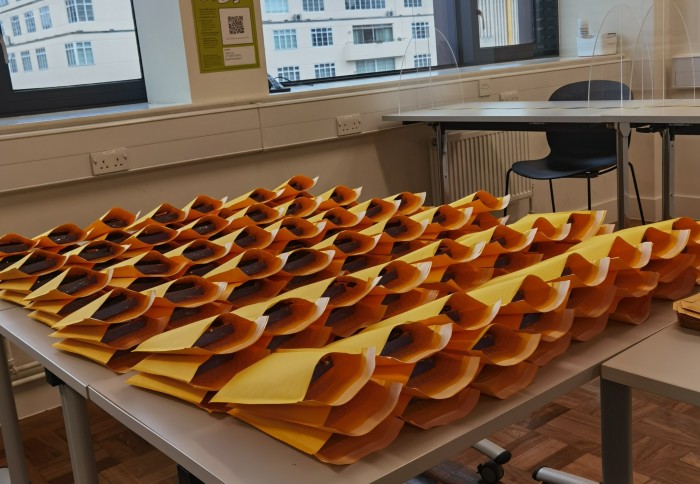Innovative Mechanical Engineering teaching: Home “Heat Transfer” kits

Heat Transfer kits, ready to be sent out
The Department of Mechanical Engineering has continued to deliver practical activity kits for remote learning.
“Heat Transfer” packages were sent at home to 168 second year students. The packages contained a water proof temperature sensor, an Arduino microcontroller, and data logging software.
Students worked together in groups to design an experiment to characterise the temperature probe and assess its suitability for an application in the Combined Heat and Power (CHP) plant at Imperial.
Students used water at different temperatures and recorded the response of the probe as it was immersed in different temperatures. They also explored the use of theoretical models, tuned by their data, to assess the probe’s performance at higher temperatures that can’t be tested at home.
As part of the home activity, students were required to perform their own risk assessment appropriate to their environment. As an example of the risk assessment in action, laptops near water were typically raised so that any spillage would not reach the laptop.

Students wrote a technical report on their work to summarise their procedure and conclusions on the suitability of the probe. The risk assessment and technical report are examples of our students developing as professional engineers who are required to bring together practical and theoretical ideas to ensure safe and sustainable technology development and implementation.
The team involved in delivering this project were: Harry Mitchell, Alexander MacLaren, Guillermo Rein, Francesca Lugaresi, Matthew Bonner, Benjamin Khoo, Mankela Lamaj and Peter Johnson.

The home activity described here is one of 19 laboratory sessions for first and second year mechanical engineering students that have been adapted to remote learning this year. Five practical activities were completed at home with kit provided by the department.
Other adaptations include students remotely controlling equipment on campus; directing technicians in live video calls to collect data as per their requirements; virtual reality activities using customised data taken from rigs on campus; and simulated experiments.
Watch a video of a second year student unpacking the home kits:

Article text (excluding photos or graphics) © Imperial College London.
Photos and graphics subject to third party copyright used with permission or © Imperial College London.
Reporter
Press Office
Communications and Public Affairs
- Email: press.office@imperial.ac.uk
